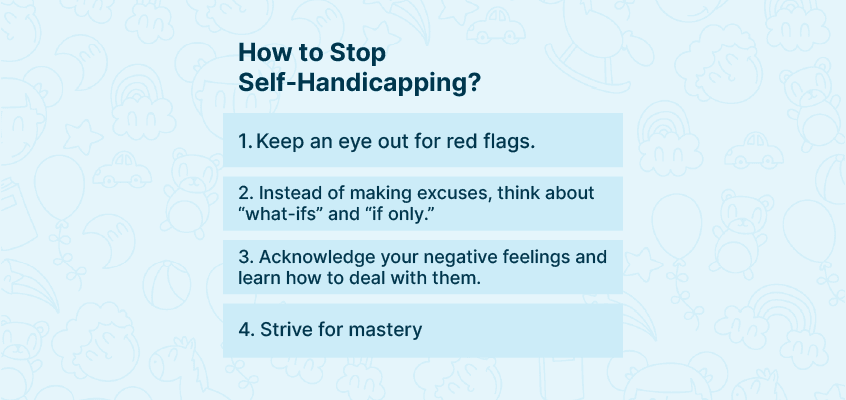How do we approach a looming problem that has a high risk of failure? We do everything we can to prepare and ensure that we will be successful in this endeavour. Surprisingly, we may be putting roadblocks on our path to success. Self-handicapping is a phenomenon where some people create justifications or even perform acts that make it more difficult to succeed in a future endeavour. Let’s take a closer look at what exactly self-handicapping means.
What is Self-Handicapping?
Self-handicapping works in ways that jeopardize your prospects of achievement. Why would somebody undertake anything that may increase their chances of failing? Researchers have discovered that to avoid taking responsibility for our failures, we sometimes go so far as to harm our prospects of succeeding. Self-handicapping is defined as behaviours or remarks that allow us to avoid exerting effort or taking responsibility for prospective failures that may harm our self-esteem. Putting out effort and failing is far more humiliating and damaging to our self-esteem than self-handicap and making excuses for why we failed. Our decisions and behaviours present us with an opportunity to internalize achievement while externalizing failure when we self-handicap. To put it another way, self-handicapping allows us to claim credit for our triumphs while blaming others for our misfortunes.
Our Wellness Programs
Why Do People Self-Handicap?
According to psychologists, we all have a strong desire to blame external circumstances for our shortcomings while taking personal responsibility for our achievements. This behaviour helps us maintain our self-esteem, but it can also lead us to do things that make us less likely to succeed. This is known as self-handicapping, which is described as a self-destructive behaviour or choice that hinders people from accepting personal responsibility for their actions.
Looking for services related to this subject? Get in touch with these experts today!!
Experts

Banani Das Dhar

India
Wellness Expert
Experience: 7 years

Devika Gupta

India
Wellness Expert
Experience: 4 years

Trupti Rakesh valotia

India
Wellness Expert
Experience: 3 years

Sarvjeet Kumar Yadav

India
Wellness Expert
Experience: 15 years
How does Self-Handicapping Work?
The first question that may pop into your mind is how does self-handicapping work?
Well people, in essence, establish barriers so that any potential failures may be blamed on these other factors. When people discover that their lack of expertise or preparedness contributed to their failure, it can be upsetting. Self-handicapping can take many distinct forms. This behaviour can be very harmless at times, but it can also be rather dangerous to others. It may even push people to participate in a potentially risky activity in some situations.
Some examples of Self Handicapping WorkOne of the examples of self-handicapping work are: |
What are the positive and negative emotions of self-handicapping?
Self-handicapping is a trade-off since it has positive as well as negative emotions of self-handicapping. Self-handicapping entails putting up a roadblock to one’s achievement. Self-handicappers reduce their odds of success while simultaneously protecting themselves from the consequences of failure. However, self-handicapping appears to have long-term consequences. Chronic self-handicappers, for example, have been demonstrated to do worse academically and adjust to life more slowly. Furthermore, as previously indicated, a person who participates in self-handicapping may face several interpersonal implications.
Some experts feel that regular self-handicapping might lead to the development of long-term self-destructive behaviours like alcoholism or drug dependence. The motivation for self-handicapping is influenced by a person’s self-esteem. For self-improvement purposes, people with high self-esteem self-handicap (or to enhance their success). People with poor self-esteem, on the other hand, self-handicap to protect themselves.
How to Stop Self-Handicapping?
We often profess we want something and then act in ways that are the polar opposite of what we desire. The ways to stop self-handicapping are by
- Keep an eye out for red flags.
Self-handicapping is characterized by reducing your efforts, making excuses, or diverting yourself (music, drink, etc.). A mentor or a coworker may frequently assist you in regaining your bearings.
- Instead of making excuses, think about “what-ifs” and “if only.”
Self-handicapping thinking may be inverted to be encouraging, according to research. Determine what you can do about the issues that are under your control.
- Acknowledge your negative feelings and learn how to deal with them.
When we utilize our “if-only’s” to push ourselves rather than excuse ourselves, research reveals that we are more prone to undergo unpleasant emotions like dissatisfaction and self-directed wrath.
- Strive for mastery.
When we are attempting to do well to minimize adverse feedback from multiple sources, such as criticism from coworkers, self-handicapping is most likely to occur. Identify what is important to you and create ideas to help you get started.
| Avoid Sabotaging your life, book a consultation with an experienced therapist |
Wrapping Up
Looking through this list, it’s important to remember that we might harm ourselves by seeking to influence how others perceive us or how we perceive ourselves. These scenarios have nothing to do with solving issues, assisting people, or advancing the team’s or organization’s objective. Self-handicapping, whether in the form of excuses or self-defeating conduct, isn’t about finding solutions; it’s about protecting the person by regulating perceptions.
For further guidance, visit the United We Care website.

















